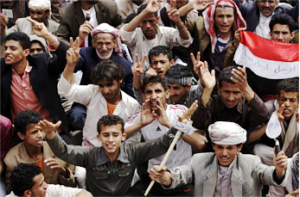
In the current situation, when the official powers in Yemen are increasingly losing control of the situation, President A. Hadi, through the mediation of Oman and Iran, has appealed to the Houthis to accept the proposal of the Crisis Regulation Committee as quickly as possible. He has promised to free two employees of the Iranian special services captured earlier in Yemen, who arrived in the Ma’rib Province with the aim of assisting the Houthis to establish arms production, to release five military instructors of the Lebanese Hezbollah from custody, who had been training “Ansar Allah” fighters, and to settle the issue of the seizure by Yemen of two Iranian ships with weapons from Iran for the Houthis.
However, the plan of the Committee has been most negatively received by the “Al Islah” political association and its chief representative in official power structures – Prime Minister M. Basindawa, who at a government meeting openly announced that the proposals contained within the document have not been agreed by him and were made on President Hadi’s own initiative. And this, the prime minister states, does not comply with the part of the “Yemeni initiative” of the CCASG regarding the formation of the government, as it breaches the principle of the formation of a cabinet of ministers only from members of “Al Islah” and the GPC (General People’s Congress). It is perfectly obvious that the head of the cabinet has no intention of ceding his place in the government to Houthis or southerners. In Basindwa’s opinion, the government can be expanded, but certainly not changed, by getting rid of its current members. Moreover, he has categorically refuted rumors that he may step down from his post as prime minister. At the same time, a tense relationship has developed between “Al Islah” and President Hadi, which is being put under further strain by the unclear position of the Houthis with respect to the plan of the Regulation Committee. All this may puncture the process of deflating the present crisis situation in the YR.
All the more so as Hadi is clearly intent on removing the prime minister, considering that this is a harsh demand of the Houthis. Moreover, according to reliable sources, Yemen’s leader is already considering certain candidates instead of Basindwa, giving preference to a representative from the North, since the President himself is a southerner. All this is important for keeping the higher powers in balance, as provided for by the decisions of the conference on national dialogue. For its part, the GPC has declared its support of the plan, emphasizing that it opens up the way to national agreement. True, there are people in the GPC who believe that the parties signing up to the initiative of the CCASG, i.e. GPC itself and “Al Islah”, as opposed to the Houthis and southerners, should be given parity when forming a new government. At any event, it’s already clear that Hadi had not consulted with anyone when drawing up his plan, and this, as the Al Islah members point out, is an extremely serious violation of a large number of conditions of the CCASG initiative. In so doing, the Yemeni President has committed an error of judgment. The situation is now in the balance as far as the state of the plan is concerned, to which the attitude of many political forces in Yemen is reserved to say the least. And these will also need to be convinced, like the Houthis, of the wisdom of accepting the proposals of the Committee under the President.
In this situation, the leader of the YR has placed the army and special services in a state of military preparedness, believing the Houthis are maintaining their camp settlements around Sana’a and conducting daily demonstrations in the Yemeni capital. As yet, however, he does not intend to use armed force. A lot will depend on what position the main external players – Iran and Saudi Arabia – will take. As yet they are not ready to hold Yemen in a decisive deadlock between them, preferring to apply the methods of political support for their adherents in Yemen and to supply them with arms.
So Yemen continues to remain a powder keg in southern Arabia, ready to explode any minute, with all the negative consequences this will have for its neighboring countries, most of all Saudi Arabia. And the possible breakup of Yemen is most likely to lead to a protracted armed conflict involving a great many external players. And the USA will not exactly win anything from all this, although in many respects it is their policies and the ideas of the strategists in Washington that have laid the foundations for the present process of reconciliation in the YR.
Hence the Americans have lost in this part of the Middle East too, and have also weakened the security of their chief Arabic partner – Saudi Arabia, and strengthened the position of Iran on the Arabian Peninsula. And any further breakdown of order in Yemen may well spill over into war in the neighboring Horn of Africa, which is already experiencing a war with the “Al-Shabaab” terrorist organization in Somalia.
Alexander Orlov, political scientist, expert in Oriental Studies, exclusively for the online magazine “New Eastern Outlook”.
